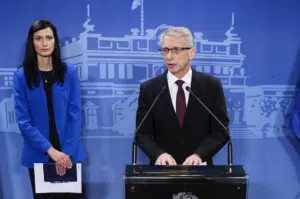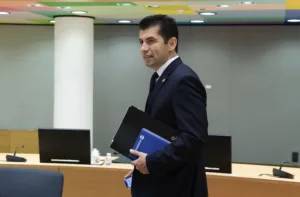Brussels – Nine months were enough to end Bulgaria’s dream of political stability. With Mariya Gabriel, the outgoing deputy prime minister, officially renouncing her position as the country’s prime minister after a nine-month rotation agreed with liberal Nikolai Denkov last June, Bulgaria now stands on the brink of a government crisis and yet another return to early elections — the sixth in three years.

Confirmation of what was anticipated last night (March 24) to the press came from Vice-Premier Gabriel herself at the National Assembly this morning (March 25). Following Prime Minister Denkov’s resignation at the
beginning of the month to honour the handover stipulated in the government pact between the conservative GERB (Citizens for the European Development of Bulgaria) party and the liberal We Continue the Change – Democratic Bulgaria, the two forces clashed for 20 days over opposing views on the alliance’s remaining
nine months.
For the conservatives, a substantial cabinet reshuffle is seen as necessary, while for the liberals, the rotation should be limited to the roles of prime minister and deputy prime minister/foreign minister (and then only between Denkov and Gabriel). Thus, 11 outgoing executive members, including Denkov, refused to join the new Gabriel cabinet. In turn, the party headed by Bulgaria’s most controversial politician, Boyko Borissov, cut off contacts for a compromise solution. As a result, the former European Commissioner for Innovation relinquished the post entrusted to her by the President of the Republic, Rumen Radev.
At this point, the President of the National Assembly, Rosen Zhelyazkov, has convened an extraordinary session for tomorrow morning (March 26) in which only the issue of the mandate awarded and rejected by Gabriel will be debated and voted on to figure out what the political and institutional direction of the country will be. In the likely event that the vote on granting the first mandate to GERB’s candidate is unsuccessful, President Radev will now have the ball back in his hands, as he will nominate the We Continue the Change candidate for a second term. Again, it is highly likely that Denkov will relinquish the post (as he anticipated last week), and the head of state will have a last chance to entrust the mandate of government before having to call the polls. But all four remaining parties in Parliament (the pro-Russian ultranationalists of Vazrazhdane, the Bulgarian Socialist Party, the Turkish minority of the Movement for Rights and Freedoms, and the populists of There is Such a People) are already looking toward early elections, which could be held in conjunction with the vote for the renewal of the European Parliament if Radev sets the date for the polls no earlier than April 9 (in the meantime, an interim executive would take office).
Political instability in Bulgaria
With the government agreement between GERB and We Continue the Change, the political instability that led the country to hold five elections in exactly two years seemed to be over. It had all started with the outcome of the polls on April 4, 2021, when the conservatives were confirmed as the leading force, but in an extremely fragmented political landscape: after three months of failed negotiations to form an executive, President Radev had decided on an early return to the polls. Anti-system propaganda had awarded the populist movement There is Such a People, founded by showman Slavi Trifonov in the July 11 elections. After another four months of unsuccessful negotiations between the parties, President Radev was forced to call for early elections in November of that year.

On November 14, 2021, a quarter of preferences went to the anti-corruption We Continue the Change party, bypassing GERB’s conservatives and pushing Trifonov’s populists in the shadows. With the support of these two forces, Kiril Petkov was appointed premier for the first time with a sense of stability and planning for the country’s future. Under his leadership, talks with North Macedonia were pursued to overcome the identity dispute blocking the opening of negotiations for Skopje’s accession to the EU since December 2020. It was precisely this effort that was fatal to Petkov. However, it did not prevent him from bringing the revocation of veto to fruition: first, Trifonov’s party switched to the opposition and then, on June 22, 2022, the government was defied with a motion filed by GERB. After a round of inconclusive consultations, it was back to voting in October, with the victory of former prime minister Borissov but the usual inability to reach a governing agreement between the parties. The last April 2, 2023 elections confirmed the now chronic political gridlock: the two most established formations paired around 25 per cent of the vote with the pro-Russian and anti-European nationalists of Vazrazhdane on the rise. This is also why the more experienced politician at the European level has been called and, despite the great difficulty in reaching an agreement between the two principal political forces, the risk of sliding into pro-Russian and anti-European chaos at the new elections convinced both parties to accept a compromise, represented precisely by the alternation to the office of premier and vice-premier over 18 months of government. With the swearing-in of the new government on June 6, 2023, Denkov immediately assumed the role of prime minister and Gabriel that of vice-premier and foreign minister, which were to be exchanged in these very agitated weeks.
English version by the Translation Service of Withub



